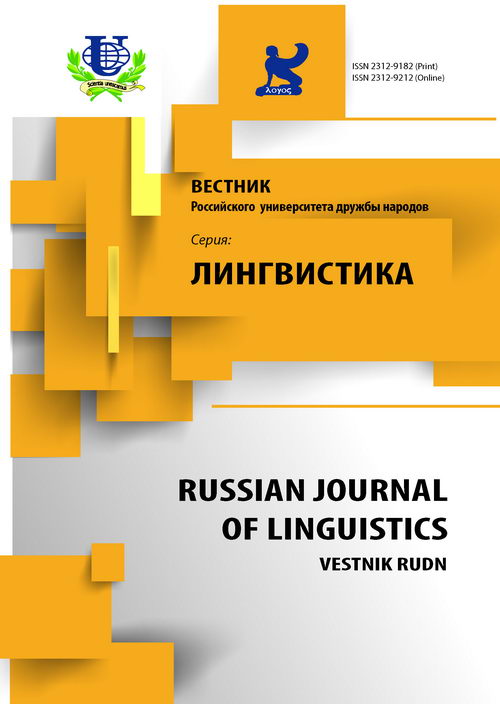‘I Was the First Westerner, the Only English Person’: Discursive Construction of National Identity
- Authors: Dubrovskaya TV1
-
Affiliations:
- Penza State University
- Issue: No 2 (2015)
- Pages: 25-40
- Section: Articles
- URL: https://journals.rudn.ru/linguistics/article/view/9346
- ID: 9346
Cite item
Full Text
Abstract
This study focuses on the issue of discursive construction of national identity. It aims to reveal how pragma-linguistic tools are exploited to construct and re-construct national identity, as well as to define how flexible it can be and how identities of the speakers correlate in dialogue. The research can be viewed as a case-study; the data for analysis come from three issues of the English language talk-show ‘Insight Germany’ on the German TV channel Deutsche Welle. Certain claims from social theories of identity are taken as a point of reference. In terms of methodology, the study draws on pragma-linguistic analysis, which takes into consideration both linguistic features of the text and extra-linguistic factors, such as personalities and their social characteristics as well as pragmatic purposes. As a result, the authors identify three levels of discursive construction of national identity: meaningful, communicative and meta-linguistic. The meaningful and meta-linguistic levels are described through the listing of tactics. The communicative level embraces heterogeneous phenomena and demands further explorations. The range of linguistic resources used to construct national identity is not limited and includes nominative units for nations and ethnicities, geographical names, names of languages, evaluative adjectives with negative and positive connotations, phonetic variants of words, and lexical and syntactic expressions of modality. The presenter’s role in interactive construction of national identity is also defined.
About the authors
T V Dubrovskaya
Penza State University
Email: gynergy74@gmail.com
Department of the English Language
References
- Cillia R. de, Reisigl M., Wodak R. The discursive construction of national identities // Discourse and Society. 1999. No. 12:2. P. 149-173.
- Dijk T. van. Prejudice in Discourse. An analysis of Ethnic Prejudice in Cognition and Conversation. Amsterdam: John Benjamins, 1984.
- Baker P., Ellece S. Key Terms in Discourse Analysis. London, NY: Continuum, 2011.
- Woodward K. Identity and Difference. London: Sage, 1997.
- Stets J.E., Burke P.J. Identity theory and social identity theory // Social Psychology Quarterly. 2000. Vol. 63. No. 3. P. 224-237.
- Spencer-Oatey H. Theories of identity and the analysis of face // Journal of Pragmatics. 2007. No. 39. P. 639-656.
- Садохин А.П. Межкультурная коммуникация. М.: Альфа-М; Инфра-М, 2004.
- Шакурова А.В., Плотников М.В. Вопросы теории социальной идентичности в социологии и психологии // В мире научных открытий. 2012. № 4.3. С. 188-220.
- Simon B. Identity in Modern Society. A Social Psychological Perspective. Oxford: Blackwell, 2004.
- Barker C., Galasinski D. Cultural Studies and Discourse Analysis. A Dialogue on Language and Identity. London: Sage, 2001.
- Истомина О.Б. Этничность как коммуникативный ресурс // Вестник Бурятского государственного университета. 2009. № 14. С. 93-97.
- Жерновая О.Р. Этнокультурная идентичность Уэльса в современном королевстве Великобритании и Северной Ирландии // Язык и культура. 2011. № 3. С. 35-43.
- Целищев Н.Н. Язык, этническая идентичность и национальное самосознание // Аграрное образование и наука. 2014. № 1. С. 13.
- Тер-Минасова С.Г. Язык и межкультурная коммуникация. М.: Слово, 2000.
- Сайт телеканала Deutsche Welle. URL: http://www.dw.de/insight-germany-talk-show/p-15605595-9798.
- Сайт федеральной службы статистики Германии. URL: https://www.destatis.de/EN/ FactsFigures/SocietyState/Population/Migration/Current.html.
- Appel R., Muysken P. Language Contact and Bilingualism. London: Arnold, 1987.
- Gross S. Code switching // Encyclopedia of Language and Linguistics. Amsterdam: Elsevier, 2006. P. 508-511.
- Fox R. Watching the English. The Hidden Rules of English Behaviour. London: Hodder, 2004.
- Дубровская Т.В. Речевые жанры «осуждение» и «обвинение» в русской и английской лингвокультурах. Пенза: ПГУ, 2014.
- Дубровская Т.В. Национально-культурная специфика отрицательных самооценок в русской и английской лингвокультурах // Молодежь и наука: слово, текст, личность. Ч. 1. Ульяновск: УлГПУ, 2014. С. 21-30.
Supplementary files















